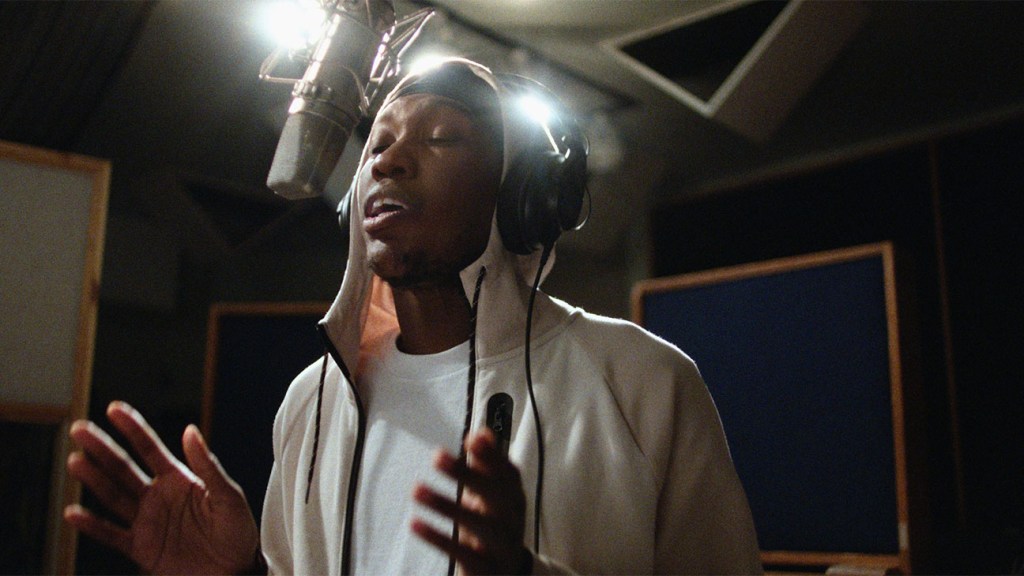
There probably isn’t a timelier Sundance premiere right now than As We Speak, an eye-opening documentary delving into the use, and misuse, of rap lyrics in criminal trials.
While the film unspools in Park City, the biggest ever case concerning this phenomenon is still ongoing. It involves Grammy-winning trap star Young Thug, who has not only been charged with heading up a murderous Atlanta street gang that also doubles as a record label, but whose own song lyrics are being used in court by the prosecution. If the latter sounds a bit shocking, As We Speak director J.M. Harper demonstrates that such a legal tactic, which mixes art and evidence to ascertain guilt, is actually nothing new.
As We Speak
The Bottom Line
Real talk.
Venue: Sundance Film Festival (U.S. Documentary Competition)
Director: J.M. Harper
1 hour 36 minutes
Structured as a road movie, with Harper following Bronx-born rapper Kemba as he conducts interviews in cities across the U.S. and then over in London, the film offers its own array of proof to show that America’s criminal justice system has been homing in on hip-hop music for quite some time. “Before they had lyrics, they had witnesses,” one Chicago-based MC points out. But now in most U.S. states, public prosecutors are using lyrics as “character evidence” to prove that defendants are living the very same lives they rap about.
As We Speak traces the criminalization of Black music back to some of its earliest known instances, when slave songs and instruments were outlawed in certain Southern states, up through the labeling of jazz as the “devil’s music” and all the way to Tipper Gore’s push to slap parental advisory stickers on rap albums in the 1980s. The film demonstrates how the powers-that-be have been silencing or censoring Black music throughout U.S. history, whether during slavery, the Jim Crow era, segregation or the period we now live in, which is one where young Black men face mass incarceration.
Every rapper that Kemba interviews, from Killer Mike in Atlanta to a handful of Drill artists in Chicago and London, defend their art by explaining how they are simply expressing themselves, using hip-hop to describe the world they live in, and, in some cases, giving their fans what they want. Moreover, they wonder why white artists haven’t been faced with the same kind of persecution — why no one had a problem with Freddie Mercury singing “Mama, just killed a man”; or, taking things further back, why nobody seems to be bothered by the violent rhymes found in many of Shakespeare’s greatest plays.
A cheeky Tarantino-esque sequence in As We Speak recreates a scene from Romeo and Juliet as a bar fight where guns are eventually drawn, underscoring how the most famous of English-language scribes could be accused of inciting the kind of violence found in the rhymes of Tupac or Biggie. To quote the Bard, there’s the rub: The same standards don’t seem to apply to everyone, and rap artists are being singled out more than most, their songs used to prove criminal intentions when other forms of evidence are unavailable.
Powerful commentary is provided by L.A. criminal defense lawyer Alexandra Kazarian, who explains why most defendants prefer to plea bargain for lighter sentences rather than face the courtroom, where their lyrics can be turned against them to sway the jury. She then puts Kemba himself on mock trial, revealing how hip-hop songs are easily manipulated by DAs to make rap artists sound guilty, even when they’re not.
There are, of course, a handful of well-known rappers who’ve been convicted for breaking the law, whether it’s Tupac, T.I. or, more recently, 6ix9ine and Torey Lanez. And let’s not forget Death Row Records founder Suge Knight, currently in prison for murder. None of them are discussed in the film — Young Thug is briefly mentioned — which definitely takes the point of view, and the defense, of lyricists who feel unjustly targeted by the American criminal justice system. The reality is that, if many rappers profess to write about what they know, some of them are also likely to practice what they preach.
But the issue in As We Speak is not whether rappers can also be criminals, but rather that rap music has become an instrument of legal coercion and institutional racism. Harper, who edited Netflix’s three-part Kanye West doc, lends an attentive ear to the various subjects Kemba interviews, all of whom defend their work as a means of self-expression and scoff at the fact that they could be penalized for it.
At a time when many question whether art should be separated from the artist — whether it’s the movies of Woody Allen or the songs of Michael Jackson — this revealing documentary shows how, when it comes to hip-hop, prosecutors across America have been conveniently refusing to distinguish one from the other.
This post was originally published on this site be sure to check out more of their content.






